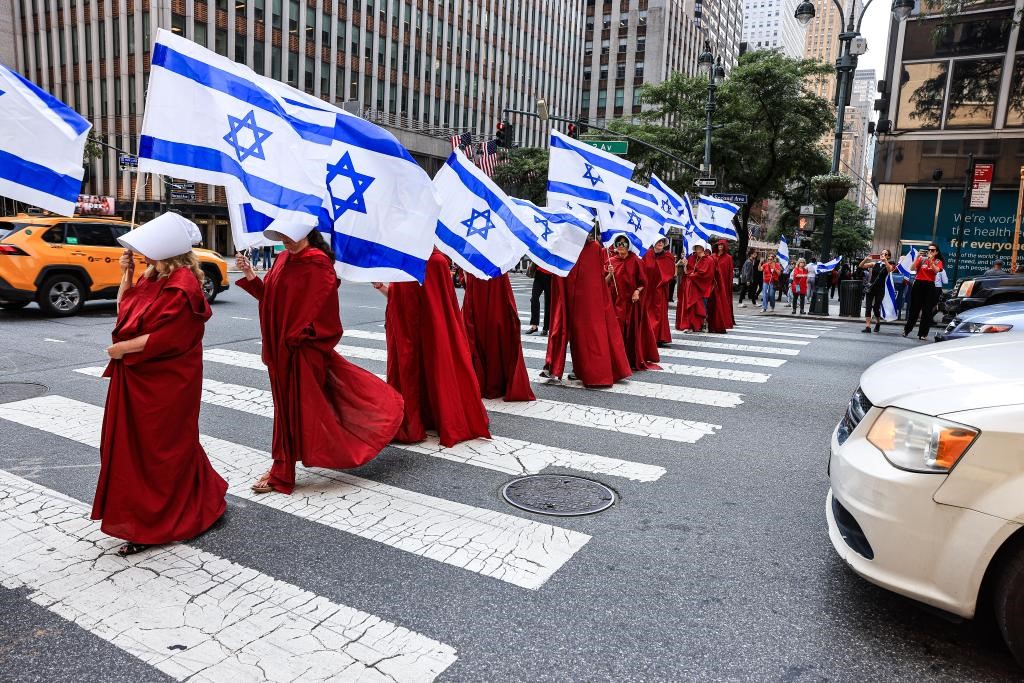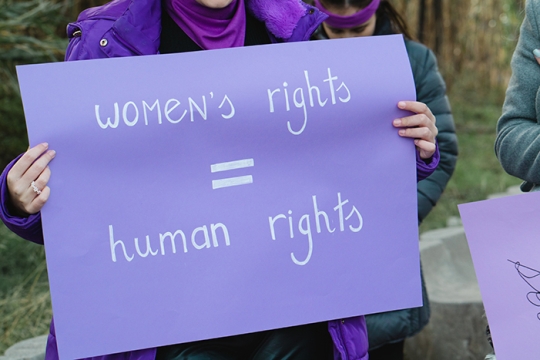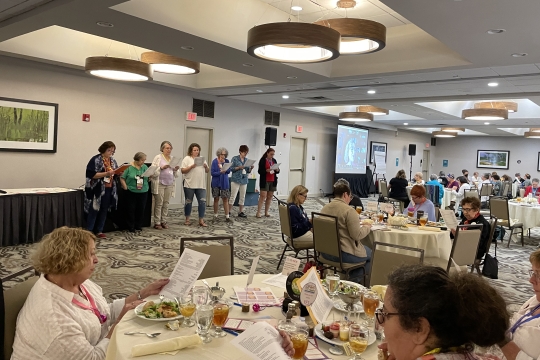
Photo credit: UnXeptable
“Astonishing.”
That is the word acclaimed author Margaret Atwood chose to describe images of protestors marching as “handmaids.” It is astonishing and inspiring to see the sea of red and white in the middle of the protests. It is astonishing and heartbreaking that these handmaids are participating in Israeli pro-democracy demonstrations that have been flooding Israel’s streets every Saturday evening for nearly 30 weeks now. By the hundreds of thousands, the Israeli population is facing down pending legislation that would undermine checks and balances and allow the current governing coalition under the leadership of Prime Minister Netanyahu to move its deeply disturbing, frightening agenda forward unfettered. There is another layer to these anti-democratic laws, noted in a modified Israeli children’s song that protestors often chant. This chant reflects their belief that if Netanyahu did not have pending prosecutions based on indictments in three cases, he would not be trying to change Israel’s judiciary.
Astonishing. Inspiring. Heartbreaking. The “handmaid” protests are more than a bit challenging in the United States after years of reproductive rights rallies where we have been urged to stay away from using the handmaid costumes. The imagery is fraught. Taken from Atwood’s novel, The Handmaid’s Tale, it is based on the subjugation of women with a direct relationship to forced childbearing. But with the long history of abusive practices that WRJ addressed in 2021 in our aptly named resolution, “Addressing a Legacy of Reproductive & Gender-Based Violence Against Black, Indigenous, and Women of Color in North America,” the false implication that only now, with the overturning of Roe, are we entering an era of that kind of subjugation misrepresents the lived history of our countries.
Israel, too, has long had issues with erasing and pushing down women in public spaces. Equality in Israel, for many, is a dream, not nearly a reality. WRJ has stood for years with the Reform movement’s Israel Religious Action Center (IRAC) in the fight for equality and against the literal erasure of women’s presence and faces from the public sphere in Israel, alongside other issues of sexism and racism. We have supported and prayed with the Women of the Wall. So, it was with a mix of discomfort and pride that I donned the red-and-white, lifted up an Israeli flag, and marched in the handmaid’s protest outside the Israeli consulate in New York last week.
While waiting to begin, we realized that the white hats, even in the costume version of the handmaid’s garb, are shaped in a way that physically silences us. It creates a literal echo chamber in which you cannot hear outside voices, only your own, reverberating in your ears and blocking all sound. It took only a minute to feel the relief of being free to tip the hat and hold a conversation. That moment was fleeting, as they lined us up and told us to be consistent with each other – flags on the right shoulder, serious faces looking ahead, walking in a block in front of the embassy. Silent. As the drum started, the blistering heat seemed to disappear. The echo became irrelevant because I was speaking with my body, my presence, and my participation, rather than my voice. The power I felt came from being united with these strangers in the imagery of protest in New York. Alone inside my red handmaid habit, isolated by the white cone that silenced me, I felt connected by a thread to everyone protesting in our handmaid’s costumes – in New York, around the world, and throughout Israel. We marched together, our international image speaking as loudly as any voice could.
Suddenly, it was over. We finished our part, took off our costumes, and rejoined the rest of the protestors, including WRJ Executive Director Rabbi Liz P.G. Hirsch and Rabbi Josh Weinberg, URJ Vice President, Israel, and Reform Zionism, who is also the Executive Director of ARZA. Free to be myself again, I raised my voice loudly and proudly as we chanted, sang, waved our Israeli flags, and showed our love for Israel and our faith in her future that we all can help shape.
The next day, Rabbi Hirsch, Rabbi Weinberg, and I had the opportunity to meet at the URJ offices with a small group of women leaders from Jewish non-profits. We came together because of the opportunity to hear from Moran Zer Katzenstein, the mastermind behind the use of the handmaid imagery in the Israeli protests and the founder of Bonot Alternativa (“Building an Alternative”). The very first protest she organized was in 2020 after the gang rape of a 16-year-old girl in Israel by thirty men who lined up to participate. Katzenstein heard the pain and brought the women of Israel together on the streets. Since then, she has used her marketing and management skills from years as a business leader to turn her passion for women’s rights and against gender-based and domestic violence into protest and change. She does not use the handmaid imagery lightly. Perhaps that is part of what Margaret Atwood found so astonishing is that the very outfits designed to silence women and make them invisible, when worn by hundreds at once in protest, actually scream for attention. They bring much-needed visibility to women’s issues in the Israeli protests and strengthen women’s voices. Like at Passover, when we engage our children by inspiring them to ask questions, the handmaids make people ask, “Why are you here.” The questions help create the platform for education and engagement.
While still an all-volunteer organization, Bonot Alternativa now partners with as many as 50 other organizations to fight for women’s rights and is very aware that they face a challenge we find familiar: to help people understand the social issues in politics and the impact on women … and then to get them to vote. Not only were there already issues of equity, safety, and equality in Israeli government and society before the recent government took office, but the next step after the judicial reform is a slew of laws that include increased systemic subjugation of women and silencing of our voices and opportunities. If the judicial “reforms” go through, these laws might well come into being in Israel. Moran showed us a striking photo of the new government ministers and their senior aides have vanishingly few women in their ranks.
Effective protest is a balance of grassroots and planning. The images of the handmaids are inspired by passion and carefully curated. Today’s protests have an impact while they happen and then a new life of impact when the images and stories are shared.
So, what can you do? There are two weeks left of this term of the Knesset, Israel’s parliament. The time is short for your voice to be heard as part of the current protests – and there are many rounds of protests to come.
Here are five things that you can do today:
Protest with the Israeli-led group that is creating protests and engagement worldwide, including across the United States: UnXeptable. Go to unxeptable.org to join the WhatsApp group and join the local protests near you. On Wednesday, July 19th, there will be a major rally in Washington, D.C., welcoming Israeli President Herzog as he addresses Congress in honor of the 75th anniversary of Israel’s statehood. Learn more here, and join if you can.
Sign up for regular English-language newsletters and updates from WRJ’s partners: Israel Religious Action Center’s The Pluralist, Israel Movement for Reform and Progressive Judaism’s Beyond the Headlines, and ARZA Weekly.
Support the IMPJ & IRAC Emergency Campaign. WRJ has made an emergency gift in support of their work, and you can, too.
Send an email to Prime Minister Benjamin Netanyahu, Minister of Justice Yariv Levin, and your local Israeli embassy/consulate to let them know that you oppose the proposed judicial reforms.
Raise your voice through WRJ: You can raise your voice right now from your device. It might feel different than being in a protest as a handmaid, but it is equally important. Your “liking” and “sharing” this post will spread the word to many more people than those who heard us in New York that day. If you “comment” as well – even just a simple, “I stand for democracy in Israel” or “Yes!!!” or “Sharing”– you impact the algorithms and make sure that these posts show up in other people’s social media feeds. Being a social justice champion in today’s world happens on the street and in our homes. We were silent when we wore the handmaid’s costumes to create the images that you can spread to the world, and that felt powerful and loud. When we like/share/comment on a social justice post from WRJ, when we forward it to our fellow WRJ members, and to our clergy and congregational staff to educate and engage them – it is powerful and loud, too. WRJ is a force multiplier for the sake of Israel because of you.
Related Posts

Celebrating Women Who Tell Our Stories

Four Tips for In-Person District Conventions


d7a4.jpg)
